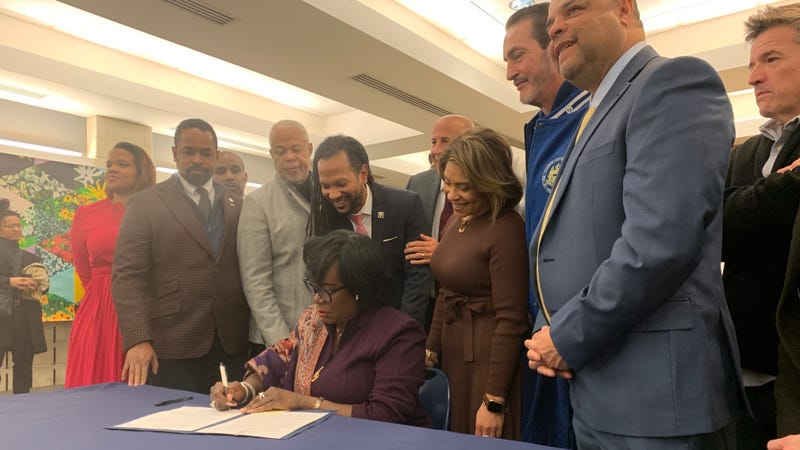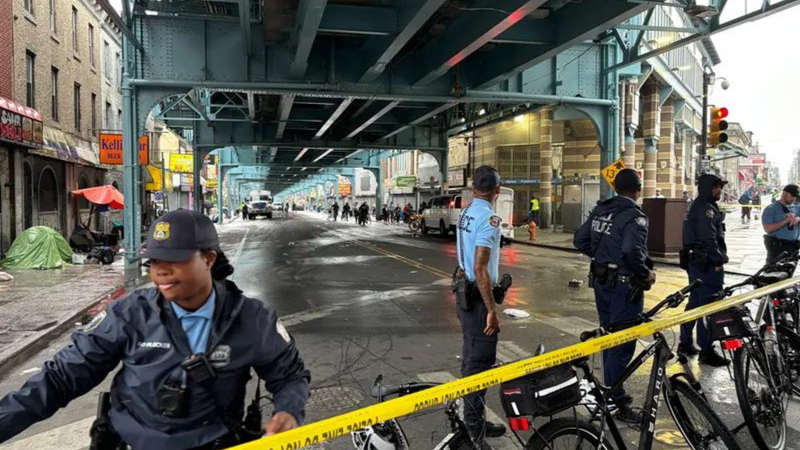
PHILADELPHIA (KYW Newsradio) — Mayor Cherelle Parker’s administration will launch a new strategy for addressing the open-air drug market in Kensington, Wednesday, with the first session of Wellness Court, a new diversion program designed to get low-level drug offenders off the street and into treatment.
“The status quo is not acceptable,” Parker said as she signed an executive order establishing the court at a news conference Tuesday in the 24th/25th police district, where the court will convene. “We are trying to do what we can with what we have to address an issue that has been ignored for far too long.”
According to the executive order, any day that Wellness Court is in session, police in those districts will have the option of issuing a summary offense for low-level crimes including public intoxication, disorderly conduct, obstructing a public passage or trespassing. Officers will be able to take the offenders directly to a triage center, where they will be assessed and, if necessary, treated for medical issues such as wound care, withdrawal or dehydration. The Defenders Association will have attorneys on hand to check on outstanding bench warrants and try to get them lifted so the offenders can qualify for treatment.
At that point, offenders will appear in Wellness Court, where the judge can approve diversion to a treatment program.
“We can treat those folks with dignity and decency, and we can also continue to reinforce that the community deserves to be delivered from the trauma of living in an open-air drug market,” said Public Safety Director Adam Geer. “It is not a cure-all, but it is also not just a band aid. We think we are doing something meaningful.”

Councilwoman Quetcy Lozada called it “a great day” for her Kensington constituents.
“We can be compassionate. We can be empathetic. We can connect people with resources, and we also can restore quality of life in the Kensington community,” she said.
The mayor created the court a little over a year after declaring a public safety emergency in Kensington on the day she took office and pledged to develop a strategy to permanently shut down the drug market there.
As part of that process, Managing Director Adam Thiel said the city first determined that there were adequate treatment beds for a diversion program but found the weak link was recovery beds. The city announced last week that it was opening a former city-owned nursing home on State Road as a recovery house called the Riverview Wellness Center, thus allowing for an end-to-end system.
Those who successfully complete the program will have their records expunged. Those who don’t will proceed to a full trial.
Parker said the situation in Kensington had been allowed to go on for far too long because of a kind of magical thinking.
“So many folks, even those elected to public office, drove by, walked by and it was almost as if, ‘Let’s just hope that if I just close my eyes real tight, it will just go away,’” she said. “You have to have the courage and the gumption to try to do what has never been done to fix the problem that has been compounded and compounded by folks who were paralyzed into inaction by fear of being criticized.”
The mayor said she is braced for criticism of this approach, both from those who say it is too soft and those who say it is too harsh.
Deputy Police Commissioner Fran Healy painted it as a balanced strategy.
“The goal is not to criminalize this behavior but to get these people off the street to where they belong so they can break the cycle,” he said. “Also, it’s important because the community gets to see us taking action and what we haven’t seen in a long time is action on the street.”
For now the court will meet only on Wednesdays, but officials say they hope to expand it to five days a week.
